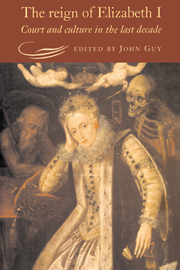Book contents
- Frontmatter
- Contents
- List of figures
- Preface
- List of contributors
- List of abbreviations
- Introduction The 1590s: the second reign of Elizabeth I?
- 1 The patronage of the crown in Elizabethan politics: the 1590s in perspective
- 2 Regnum Cecilianum? A Cecilian perspective of the Court
- 3 Patronage at Court, faction and the earl of Essex
- 4 Peers, patronage and the politics of history
- 5 The fall of Sir John Perrot
- 6 The Elizabethan establishment and the ecclesiastical polity
- 7 Ecclesiastical vitriol: religious satire in the 1590s and the invention of puritanism
- 8 Ecclesiastical vitriol: the kirk, the puritans and the future king of England
- 9 Social strain and social dislocation, 1585–1603
- 10 Lord of Liberty: Francis Davison and the cult of Elizabeth
- 11 The complaint of poetry for the death of liberality: the decline of literary patronage in the 1590s
- 12 Summer's Last Will and Testament: revels' end
- 13 The theatre and the Court in the 1590s
- Index
13 - The theatre and the Court in the 1590s
Published online by Cambridge University Press: 06 January 2010
- Frontmatter
- Contents
- List of figures
- Preface
- List of contributors
- List of abbreviations
- Introduction The 1590s: the second reign of Elizabeth I?
- 1 The patronage of the crown in Elizabethan politics: the 1590s in perspective
- 2 Regnum Cecilianum? A Cecilian perspective of the Court
- 3 Patronage at Court, faction and the earl of Essex
- 4 Peers, patronage and the politics of history
- 5 The fall of Sir John Perrot
- 6 The Elizabethan establishment and the ecclesiastical polity
- 7 Ecclesiastical vitriol: religious satire in the 1590s and the invention of puritanism
- 8 Ecclesiastical vitriol: the kirk, the puritans and the future king of England
- 9 Social strain and social dislocation, 1585–1603
- 10 Lord of Liberty: Francis Davison and the cult of Elizabeth
- 11 The complaint of poetry for the death of liberality: the decline of literary patronage in the 1590s
- 12 Summer's Last Will and Testament: revels' end
- 13 The theatre and the Court in the 1590s
- Index
Summary
Looking back at his career as a dramatist, Ben Jonson concluded that ‘I have considered, our whole life is like a Play: wherein every man, forgetful of himself, is in travaile with expression of another. ’ Thus Jonson neatly encapsulated a view shared by many of his contemporaries. The metaphor whereby the actions of men and women are seen as theatre, and the world wherein such actions occur as a stage, recurs constantly: Francis Bacon used it in his legal pleadings; the historian, John Hayward, saw the past in terms of the acts of a play; the diplomat, Sir Thomas Lake, described events in France the same way. Sir Walter Ralegh wittily extended the metaphor to the drama of salvation itself, a comedy where
Heaven the judicious sharp spectator is,
That sits and marks still who doth act amiss.
Yet, as Ralegh well knew, God was not the only audience for the human comedy, and many below the eminence of the deity comfortably passed judgement on the way in which the men and women of the Court played their parts.
Rôle-playing indeed was of the essence of being a courtier, and many a reader, then and now, of Castiglione's handbook has wondered whether there was any substance at all beneath the fine display and elegant acting. For the satirist, John Marston, ‘Castilio’ was a fop, a talker, a writer of sugared sonnets not entirely his own, that is, one who projected an image far beyond any hope of realization.
- Type
- Chapter
- Information
- The Reign of Elizabeth ICourt and Culture in the Last Decade, pp. 274 - 300Publisher: Cambridge University PressPrint publication year: 1995
- 1
- Cited by



